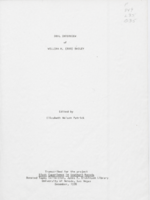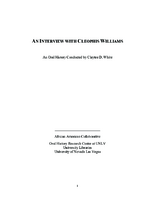Search the Special Collections and Archives Portal
Search Results

Transcript of interview with William H. Bailey by Betty Rosenthal, March 16, 1978
Date
Archival Collection
Description
Interview with William H. Bailey conducted by Betty Rosenthal on March 16, 1978. Arriving in Las Vegas in 1955, Bailey became an assistant producer and master of ceremonies in the first interracial hotel in Nevada, the Moulin Rouge, and subsequently worked in radio and television. Bailey reflects on the history of discrimination in Las Vegas and its impact on the entertainment industry. Bailey's wife Anna was the first black girl dancer on the Strip in the 1961 production, "Nymphs of the Nile." Appointed by Governor Grant Sawyer to the Nevada State Equal Rights Investigatory Commission in 1961, Bailey served as its chairman and traveled throughout the state holding hearings. He describes his work on the commission and how discrimination in housing personally affected him.
Text

Transcript of interview with Daisy Lee Miller by Claytee White, March 22, 2013
Date
Archival Collection
Description
Daisy Lee Miller talks about being born and raised as an only child in Louisiana before moving to Las Vegas in her 20s. For a time, Daisy worked in the powder room at the California Club. It was while she was employed here that she realized she wanted something better, and she wanted to be a good example tor her kids. Daisy began attending the University of Nevada, Las Vegas to get her degree. Daisy is very proud of the fact that she graduated from UNLV at the same time that her daughter graduated from high school. Family has always been very important to Daisy, and she enjoyed spending time with her children while they were growing up. Sundays always found Daisy and her children at church while other leisure-time activities included trips to the lake or Mt. Charleston. While going to school, Daisy worked at the Economic Opportunity Board in the family planning program. Following graduation, Daisy began working for the Clark County School District where she rapidly advanced
Text

Transcript of interview with Cleophis Williams by Claytee White, April 27, 2010
Date
Archival Collection
Description
In 1943, Cleophis Hill Williams was a teenager visiting her mother who had moved to Las Vegas. For most of her young life she had lived with her parents in Muskogee, Oklahoma and Paul Spur/Douglas, Arizona. The same year that she visited Las Vegas, she met her future husband Tom Williams, with whom she had nine children, all born and raised on the Westside. Tom worked construction and built their first home on G Street. For Cleophis, she focused her life on raising her children and, whenever possible, finding some precious time to read.
Text
Milton Norman Photograph Collection
Identifier
Abstract
The Milton Norman Photograph Collection (1943-1970) consists of black-and-white photographic prints and negatives taken by City of Las Vegas Code Enforcement officer Milton Norman. The images were recorded as part of a survey of substandard residential dwellings built in the then racially segregated communities of the Westside and Vegas Heights in Las Vegas, Nevada.
Archival Collection
Audio recording clip of interview with Jerry Eppenger by Claytee D. White, September 14, 2011
Date
Archival Collection
Description
Part of an interview with Jerry Eppenger by Claytee D. White on September 14, 2011. Eppenger describes his arrest for a curfew violation while leaving work following a riot on the Westside in 1969.
Sound
Audio recording clip of interview with Ruth Eppenger D'Hondt by Claytee D. White, August 25, 2011, and July 9, 2012
Date
Archival Collection
Description
Part of an interview Ruth Eppenger D'Hondt conducted by Claytee D. White on August 25, 2011. D'Hondt shares memories of her parents' restaurant.
Sound

Transcript of interview with Billy Paul Smith by Claytee White, October 3, 2013
Date
Archival Collection
Description
Chemist, mathematician, and health physicist Billy Paul Smith donates time to tutor young people in hopes of attracting more youth into the fields of math and science. Born in 1942 and schooled in segregated black schools in Shreveport, Louisiana, and Texarkana, Texas, he graduated from high school at age fifteen and enrolled at Prairie View A&M University, where he trained with the Reserve Officer Training Corps (ROTC) and earned his Bachelor’s degree in chemistry and in 1964 his Master’s degrees in chemistry and math. Most young U.S. Army officers in 1964 went to Vietnam, but Billy’s math and science background steered him to the Army Chemical Corps, where he was quickly selected to join a new team. The team was to develop responses to nuclear weapon accidents and worked under the Defense Atomic Support Agency (DASA) in Albuquerque, New Mexico. At the same time, Billy completed the Weapons Ordinance Army course on classified information relating to the U.S. nuclear weapons arsenal. In this interview, Billy talks about his service with DASA and his subsequent twenty-seven years working at the Nevada Test Site in a variety of positions with Reynolds Electrical and Engineering Company, Inc. (REECo), a company that had “percentagewise more blacks in management positions than any other [Las Vegas] company.” He experienced the quiet racism of Las Vegas residential segregation when he tried to purchase a house in a neighborhood he liked and the unexpected kindness of the REECo general manager, Ron Keen, who made sure the Smith family could live where they wanted to live. He talks about Area 51 and explains underground testing activity and offers the scientific and ecological reasons why scientists deemed Yucca Mountain safe to store nuclear waste. After retiring at fifty-two, Billy and a colleague formed an independent instrumentation company, which, from 1995–2005 provided and calibrated radiological measurement and detection instruments for the decommissioning and closure of the Rocky Flats nuclear plant in Golden, Colorado. During that time, Billy rented an apartment in Boulder, but he and Jackie maintained their Las Vegas home, where they still reside. Billy shares memories of places he and his wife used to enjoy on the Westside and tells of their longtime friends in the black community. He also talks about developing his philosophy of philanthropy through Alpha Phi Alpha Fraternity and discusses becoming a member of the Knowledge Fund Advisory Council for the Governor’s Office of Economic Development (GOED) and the advisory council for the Nevada System of Higher Education.
Text

William O'Neill McCurdy Sr. oral history interview: transcript
Date
Archival Collection
Description
Oral history interview with William O'Neill McCurdy by Claytee D. White on January 26, 2022 for the African Americans in Las Vegas: A Collaborative Oral History Project. In this interview, McCurdy describes his childhood growing up in Las Vegas, Nevada, graduating from Valley High School, and attending Western Nevada College in Carson City, Nevada. He worked for many years for the Parks and Recreation department, and has served on numerous boards including the Citizens' Advisory for Regional Transportation (RTC), Habitat for Humanity Board of Director, Mineral County Economic Advisory Committee, City of Las Vegas Community Block Grant Advisory Board, and Southern Nevada Regional Housing Authority Commission. Currently, McCurdy owns McCurdy & McCurdy Media Group, a political consulting and advertising firm which has assisted numerous political candidates in fulfilling their dreams of helping to govern Las Vegas, Clark County, the State of Nevada, and even in the United States Congress.
Text
